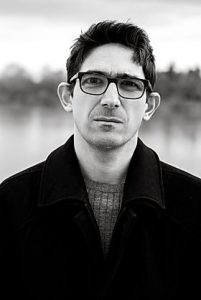
BY YOUSSEF BELHAJ youssef.belhaj@ug.bilkent.edu.tr
When I listen to music, I always think about the composer of that music: I wonder about the ideas that he was trying to transmit, and the process he went through to give life to his pieces. I finally got an answer to some of those questions, and was able for the first time to put myself into the shoes of a composer and learn more about the inner workings of his thought, by conducting an interview with Asst. Prof. Tolga Yayalar, a contemporary music composer and chair of the Department of Music.
So, dear composer, the floor is yours!
How do you define being a composer?

Music composition has changed since the beginning of the 20th century; nowadays we composers see ourselves as sonic sculptors. Our raw material is sound, and we work with it, as opposed to simply working with notes or rhythms.
Was composition something that you planned to do?
From the time I started studying music, I never wanted to be a performer. I always wanted to be the one creating the music. I wanted to compose music, something that has always been magical and mysterious to me.
From where do you get inspiration for the pieces you compose?
From everyday sounds and noises. I’m also inspired by nonmusical subjects like science, natural phenomena, etc., and try to model them into music without being literal.
Can you tell us about the process of composing a musical piece?
The process starts with pre-compositional planning, in which I collect my composition data; those are sounds that I record and analyze. I usually prefer to start writing using a pencil and paper before moving to the computer. I rarely start writing from the beginning of a piece; I more often start in the middle.
I usually have deadlines (my nightmares) for submitting scores to the performers. After a score is submitted, a process of feedback, of exchange between us begins, in order to optimize the quality of the performance as well as to start rehearsals with everything in order. The rehearsals are very important, since we use them to clarify our ideas to the performers.
The whole process takes three to four months for a 10-minute piece and up to six months for longer pieces.
How would you describe the moment in which you hear one of your pieces performed live?
It’s the moment I live for – especially in the case of the first performance, when I still feel that the piece is mine. A performance may be rewarding, but it can be disappointing, too.
While listening to your pieces, do you concentrate on the orchestra or on the people in the audience?
During a performance, I don’t like to be distracted by looking at either the orchestra or the audience; I like to just close my eyes and focus on the music.
What are your thoughts about the historical evolution of classical music, from baroque to contemporary music? Do you think music has improved?
Music is changing. Change is inevitable in all domains of life; you can’t point to a single peak anywhere, saying that some music has transcended all other. Even though Beethoven’s music is considered to be a reference of greatness in classical music, his later pieces were severely criticized by his contemporaries. This was because he used very advanced techniques that were hard for people to understand at the time.
What I can say about this evolution is that composition today is more varied than in the past, when there were many restrictions with regard to format. With the new techniques, the composer’s creativity is not restricted. Nowadays, when you sit down to compose, you have a variety of choices: you can make music using only white noise, you can make music using only one note, or of course you can still make tonal music.
Contemporary classical compositions are often nonmelodic pieces featuring dissonance and unconventional sounds, without a steady rhythm. This makes them less accessible to the public. Given this, how can we understand and enjoy contemporary music?
People always come up to me after a concert, saying that they didn’t understand the music I wrote. For me, listening to music is first and foremost a physical, sonic experience. The abstract nature of music is hard to understand. Do we really understand Mozart’s music? It’s nice music on the surface, but enjoying it doesn’t mean that we understand it. His music is so connected to the lifestyle and aesthetics of the 18th century that truly understanding it requires a thorough knowledge of the time period. In that case, today’s music should be much more understandable to contemporary society. And also, if you don’t understand a piece of music, that’s fine; maybe it’s not meant to be understood, but rather experienced physically and sonically. Moreover, not all contemporary music is dissonant. In the US, for example, the majority of new music compositions are consonant, melody-oriented pieces.
If Beethoven and Mozart were able to listen to contemporary music, would they like it?
If you were to make anyone from the 18th century listen to contemporary music, he’d freak out. He wouldn’t like it because he would evaluate it using 18th-century criteria. So much of what we do these days wouldn’t even be considered music. Personally, I see contemporary music as belonging to modern society, just like any other art form.
What are your expectations concerning the future of classical music? Will we still see orchestras and people attending classical music concerts?
Orchestras nowadays serve the same purpose as museums: they help preserve human civilization and culture. So we need orchestras today, and we’ll need them in the future. However, some steps should be taken to modernize classical music, whose method of consumption seems to me a little old fashioned. I think we should break down the established protocols; for instance, why not have concerts outside traditional concert halls, with musicians wearing casual clothes? Disregarding that protocol would help make classical music more accessible to young people.
